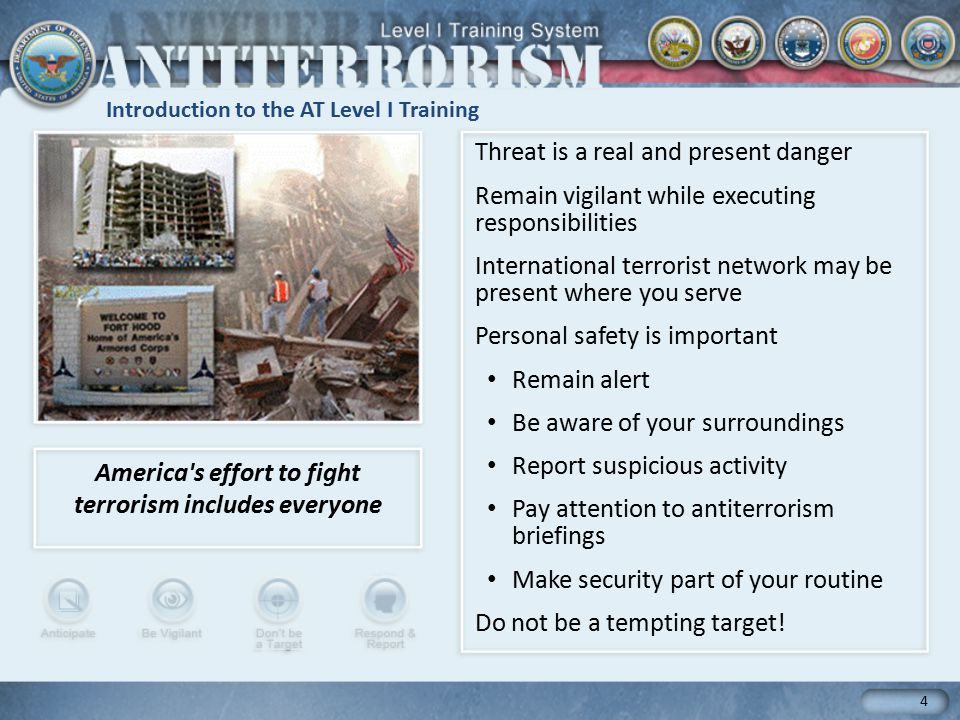Level 1 Antiterrorism Awareness Training

In an era marked by evolving global threats, ensuring the safety and security of nations has become an imperative concern. As terrorism continues to pose a significant risk, governments around the world have implemented various strategies to mitigate these threats. One crucial component in the arsenal against terrorism is Level 1 Antiterrorism Awareness Training. This training plays a pivotal role in equipping individuals with the knowledge and skills necessary to identify, prevent, and respond to potential terrorist activities. In this article, we will explore the significance of Level 1 Antiterrorism Awareness Training and its impact on national security.
Understanding Level 1 Antiterrorism Awareness Training:
Level 1 Antiterrorism Awareness Training is a foundational program designed to educate individuals on the fundamental aspects of terrorism, its indicators, and the importance of vigilance in countering potential threats. This training is not exclusive to military personnel; it extends to civilians, contractors, and individuals in various sectors, recognizing that everyone has a role to play in maintaining national security.
Key Components of Level 1 Antiterrorism Awareness Training:
- Understanding Terrorism: At the core of Level 1 Antiterrorism Awareness Training is the comprehension of what constitutes terrorism. Participants are educated on the various forms of terrorism, including domestic and international threats, as well as the motivations that drive such activities.
- Recognizing Indicators: The training emphasizes the identification of behavioral and environmental indicators that may signal potential terrorist activities. This includes unusual behavior patterns, suspicious activities, and the presence of unattended items in public spaces.
- Cybersecurity Awareness: In the digital age, terrorism has extended its reach into cyberspace. Level 1 training incorporates cybersecurity awareness to educate individuals on potential cyber threats and the importance of safeguarding sensitive information.
- Personal Security Measures: Participants are instructed on practical personal security measures, such as the importance of maintaining situational awareness, securing personal belongings, and reporting suspicious activities promptly.
- Response Protocols: Level 1 training equips individuals with the knowledge to respond effectively in the event of a potential threat. This includes understanding evacuation procedures, communication protocols, and coordination with law enforcement agencies.
- Cultural Awareness: Given the diverse nature of societies, understanding cultural differences and fostering inclusivity is integral to effective antiterrorism efforts. The training emphasizes cultural awareness to prevent misconceptions that may lead to unwarranted suspicions.
Benefits of Level 1 Antiterrorism Awareness Training:
- Empowering Individuals: By providing individuals with the knowledge and tools to identify and respond to potential threats, Level 1 training empowers them to actively contribute to national security. This empowerment extends beyond the workplace to create a more vigilant and resilient society.
- Enhanced National Security: A well-trained and vigilant population serves as an additional layer of defense against terrorism. Level 1 training contributes to enhanced national security by creating a network of individuals who can recognize and report suspicious activities, thereby aiding authorities in preventing potential attacks.
- Risk Mitigation: The ability to identify and mitigate risks is a key outcome of Level 1 Antiterrorism Awareness Training. By fostering a culture of vigilance, organizations and communities can proactively address potential threats, reducing the likelihood of successful terrorist activities.
- Adaptability to Evolving Threats: Terrorism is a dynamic and ever-evolving threat. Level 1 training is designed to be adaptable, ensuring that individuals stay informed about emerging trends and tactics employed by terrorists. This adaptability is crucial in staying ahead of potential threats.
- Fostering a Unified Front: Level 1 training promotes a sense of collective responsibility for national security. When individuals across various sectors undergo this training, it fosters a unified front against terrorism, with a shared commitment to creating a safer and more secure environment.
Challenges and Opportunities:
While Level 1 Antiterrorism Awareness Training is a critical component of national security efforts, there are challenges that must be addressed. Ensuring widespread participation, maintaining the relevance of training content, and overcoming complacency are ongoing challenges. However, these challenges also present opportunities for continuous improvement and refinement of training programs to meet the evolving nature of terrorist threats.
Conclusion:
Level 1 Antiterrorism Awareness Training stands as a cornerstone in the collective efforts to combat terrorism and safeguard national security. By educating individuals on the intricacies of terrorism, fostering vigilance, and promoting a sense of shared responsibility, this training contributes significantly to the resilience of societies against potential threats. As the global landscape continues to change, the importance of Level 1 training cannot be overstated, and its continued evolution is essential in the ongoing battle to secure a safer future for all.





